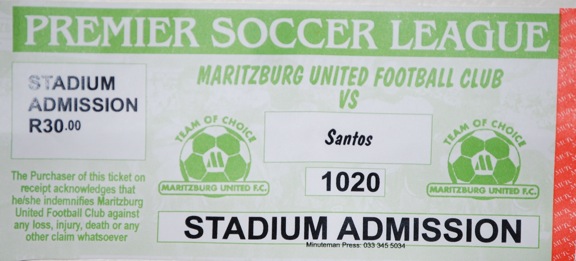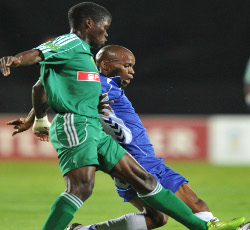
The South African Football Association and the Premier Soccer League have announced a dramatic increase in ticket prices for 2010-11 PSL season. The official explanation given was a need to ensure the long-term sustainability of World Cup stadiums and provide funds for grassroots football.
‘It’s nice to say we filled Soccer City with 88,000 people, but how much do we charge them, R50? [Generally, it’s R20-25.] ‘What is the cost of hiring that stadium? Over R500,000,’ SAFA CEO Leslie Sedibe recently told a parliamentary committee.
PSL chairman Irvin Khoza said on Friday that high stadium costs and an agreement with the South African Players Union for a minimum wage and basic rights meant that, ‘We have no option but to increase our prices. It is always unfortunate when one has to make increases, but there is no way we can continue to charge R20 for 90 minutes any longer.’
Neither Sedibe nor Khoza commented on the inconvenient fact that only two of the ten expensive World Cup stadiums are scheduled to regularly host PSL matches. The exceptions are: Durban’s Moses Mabhida Stadium, AmaZulu’s home base, and Royal Bafokeng in Rustenburg, home of Platinum Stars. Perhaps a third one will follow if Ajax Cape Town end up using Cape Town Stadium. Cities without PSL teams like Polokwane, Port Elizabeth and Nelspruit are desperate to get rugby into their new stadiums to have a (distant) shot at making ends meet.
Meanwhile in Gauteng, Orlando Pirates, Kaizer Chiefs, Moroka Swallows, Mamelodi Sundowns and Supersport United announced their home grounds for 2010-11: Orlando Stadium, Rand Stadium, Dobsonville Stadium, HM Pitje Stadium, and Super Stadium respectively. These high-powered clubs, in other words, shunned the 2010 venues of Soccer City, Ellis Park, and Loftus Versfeld for smaller, cheaper grounds.
Local football bosses have also argued that ticket revenues would, of course, benefit grassroots football. ‘Prices will have to be revisited if we are serious about funding development because that’s where the money will come from,’ said Sedibe. SAFA’s pitiful record in every aspect of local football development — infrastructure, youth programs, coaching, administration — means only the most delusional fans believe that additional ticket revenues will suddenly make SAFA ‘serious’ about improving the grassroots game.
With R40 billion in public funds spent on World Cup stadiums and other 2010 construction projects, it is no wonder that fans are angry about the ticket increases. R40 is a substantial amount of money for a typical local supporter who earns about R1500 a month; and he or she is among the fortunate ones who have a job since the unemployment rate in South Africa is 25 percent (the unofficial rate is 40 percent). As the seventh richest league in the world, shouldn’t the PSL, rather than blue-collar fans, help offset some of the costs? Imagine, a wealthy private company not dumping all of its costs on the backs of ordinary people!
The ticket saga highlights a crucial legacy of the World Cup: South Africa’s deeper incorporation into the media-driven global football business. The powerbrokers in domestic football appear less interested in expanding the fan base than in creating more profitable audiences. These are made up of middle-class folks willing and able to pay for pricier tickets, merchandise, satellite TV packages, broadband internet and the other luxuries of contemporary fandom.
In light of these changes, what can be done? Well, one good place to start is to fight to ensure equitable access to the professional game at stadiums and on television. Fans should be able to pay fair and reasonable ticket prices, especially when stadiums are built with public funds. In addition, pressure must be put on broadcasters, football bodies, and regulatory authorities to show as many local and international matches as possible on free-to-air TV. It is the People’s Game after all.
Tag: PSL
Vuvuzela 1 PSL 0

A family night out with 6,000 friends. Maritzburg United vs Amazulu: KwaZulu-Natal derby in the round of 32 of the Nedbank Cup, South Africa’s FA Cup. At kickoff, deafening kwaito music gives way to a cacophony of vuvuzelas. Not exactly kid friendly, but there it is. The relaxed mood of this Saturday night crowd, a pleasant mix of men, women and children of all backgrounds, makes up for the dreadful football on display.
The home side is slightly more enterprising in the second half, but deep into injury time the visitors’ Brad Ritson scores a counter-attack winner. Cruel. Final.
As we, the deflated masses, leave the friendly confines of Harry Gwala Stadium, I found myself wondering — again — why PSL teams played such awful soccer on a regular basis. Then I thought of the wisdom shared by Thabo Dladla, director of Izichwe Youth Football (where my daughter plays), in his column this week:
‘The idea of playing and keeping the ball longer does not exist . . . [with] less than 100 completed passes in most PSL matches’ Dladla writes, ‘I doubt if Lionel Messi would have played under most South African coaches. [In the apartheid era] football played a huge role in entertaining people. It was important to win in style. Both players and fans had a lot of fun during a game. These days one sees more creativity in the grandstands than on the field’. And as much as I viscerally detest the vuvuzela’s sonic pollution, it is the truth.